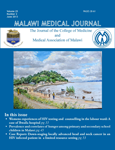
|
Malawi Medical Journal
College of Medicine, University of Malawi and Medical Association of Malawi
ISSN: 1995-7262
Vol. 26, No. 4, 2014, pp. 109-114
|
 Bioline Code: mm14023
Bioline Code: mm14023
Full paper language: English
Document type: Research Article
Document available free of charge
|
|
|
Malawi Medical Journal, Vol. 26, No. 4, 2014, pp. 109-114
| en |
The quality of care of diabetic patients in rural Malawi: A case of Mangochi district
Assayed, A. A.; Muula, A. S. & Nyirenda, M. J.
Abstract
Background
Diabetes mellitus is a global public health problem. In Malawi, the
prevalence of diabetes is 5.6% but the quality of care has not been well
studied.
Objective
The aim of this study was to assess the quality of care offered to diabetic
patients in Mangochi district.
Methods
This was a cross sectional descriptive study. Quantitative data were collected
using a questionnaire from a sample of 75 diabetic patients (children and
adults) who attended the Diabetes Clinic at Mangochi District Hospital
between 20012 and 2013. Qualitative data were also collected using
semi-structured interviews with eight Key Informants from among the
District Health Management Team. Frequencies and cross-tabulation were
obtained from the quantitative data. Patients’ master cards were checked
to validate results. Clinical knowledge about diabetes, care practices and
resources were the themes analysed from the qualitative data.
Results
Among the 75 participants interviewed, 46 were females and 29 males.
The overall mean age was 48.3 years (45.6 for females and 53.3 for males).
More than half of patients had little or no information about diabetes
(40.0 % (n=30) and 22.7 (n=17) respectively. The majority of patients
were taking their medicines regularly 98.7% (n=74). Only 17.3% (n=13)
reported having their feet inspected regularly. Fifty-six percent of patients
were satisfied about services provision. Some nurses and clinicians were
trained on diabetes care but most of them left. Guidelines on diabetes
management were not accessible. There were shortages in medicines (e.g.
soluble insulin) and reagents. Information Education and Communication
messages were offered through discussions, experiences sharing and
posters.
Conclusion
Quality of diabetes care provided to diabetic patients attended to Mangochi
hospital was sub-optimal due to lack of knowledge among patients and
clinicians and resources. More efforts are needed towards retention of
trained staff, provision of pharmaceutical and laboratory resources and
health education.
|
| |
© Copyright 2014 - Malawi Medical Journal
Alternative site location: http://revista.uft.edu.br/index.php/jbb/index
|
|
